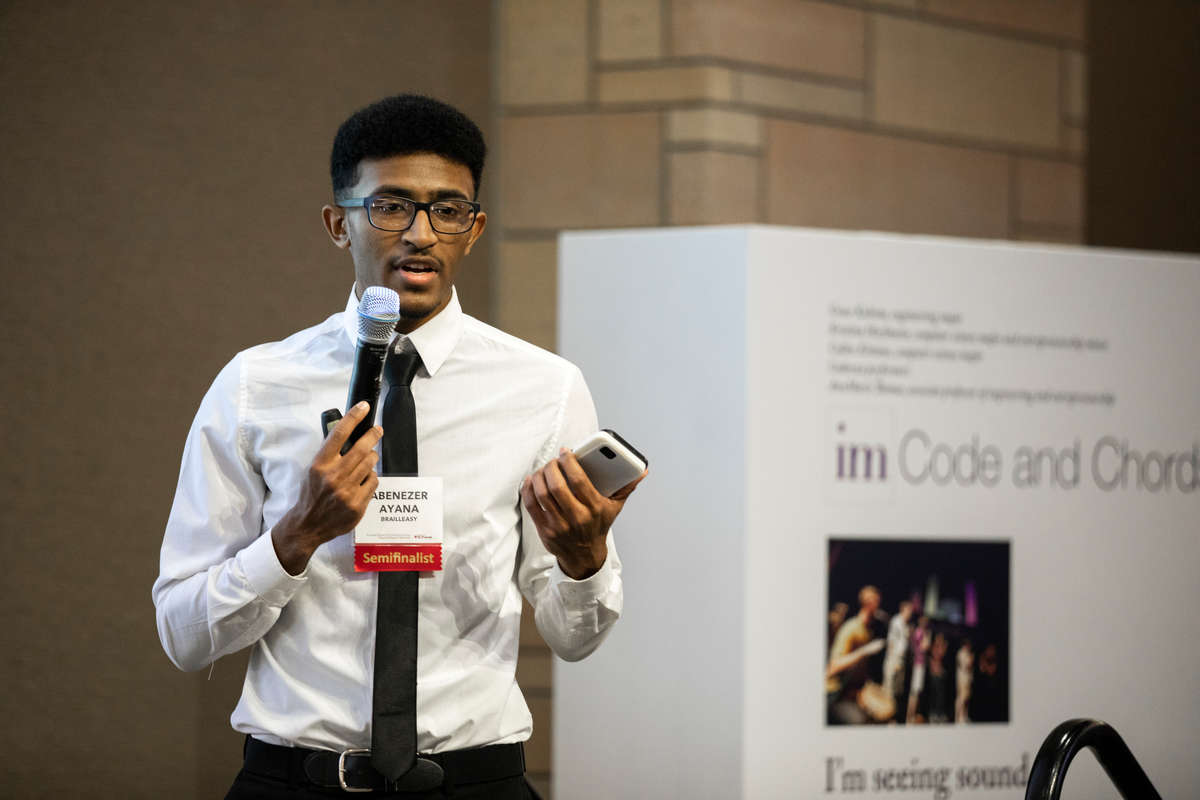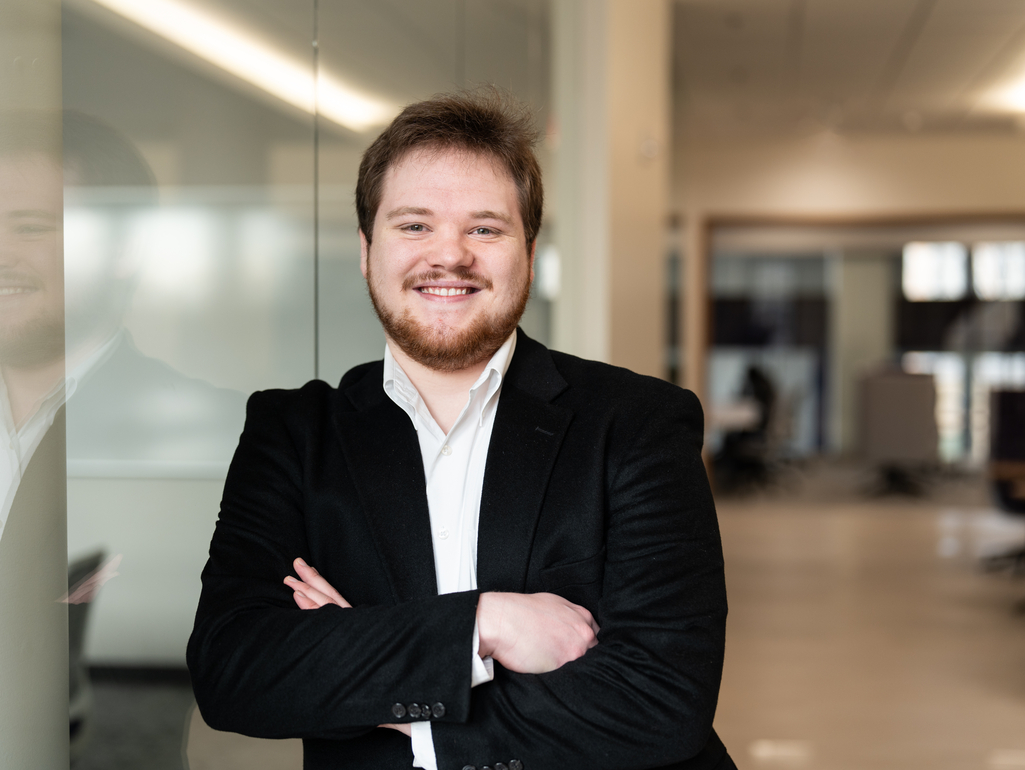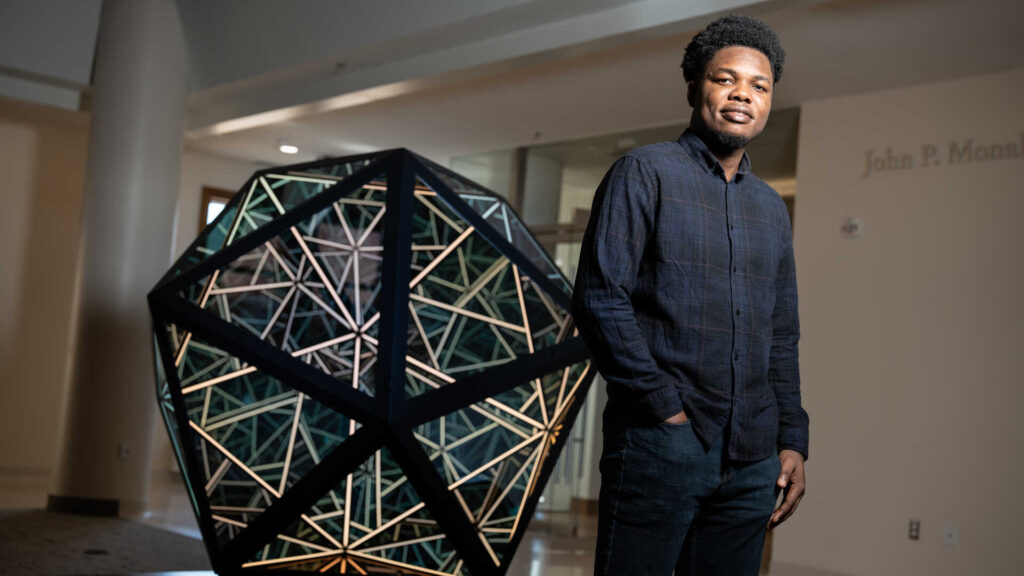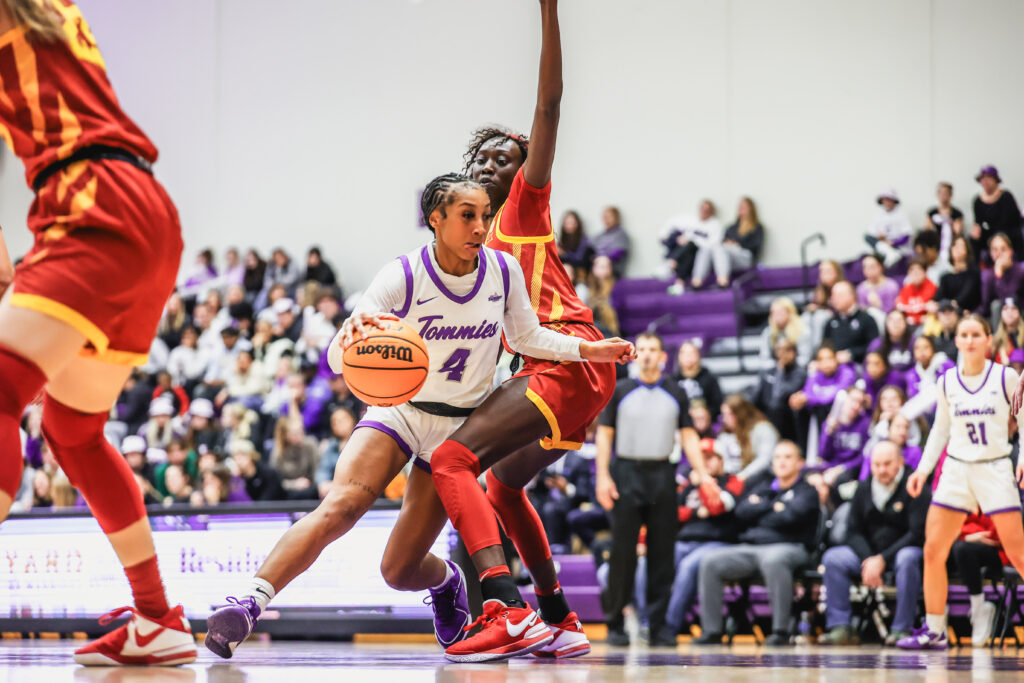Originally from Ethiopia, Abenezer Ayana ’21 is leaving his mark at St. Thomas by applying his computer science background and taking advantage of the resources that surround him as a curious and driven entrepreneur. Looking to make big change in the U.S. and in Ethiopia, Ayana has worked toward pitching three ideas in Schulze School of Entrepreneurship competitions: OmniPresent, BraillEazy and Fendesha, taking home two winning submissions to further polish.
With a life mission to help those around him find Christ, Ayana continues to make the most of his college career and recently aided in KINETIC, an initiative to make funding available and accessible for all aspiring entrepreneurs.
Here are some highlights from our conversation.
Tell me about yourself.
I am originally from Ethiopia. I came here seven years ago, [and] attended a boarding school in Piney Woods, Mississippi, for two years. After graduating from there, I transferred to Normandale Community College with an associate degree in computer science. Then I transferred to St. Thomas to pursue my bachelor's degree.
I’m more of a creative person, so when I was a kid, I was scribbling ideas and fascinated [with] things about business.
I had a passion for computer science and technology so that was something that I tried to merge in, and thankfully [at] St. Thomas I was able to put my computer science background into entrepreneurship and create some start-ups.
I'm a follower of Christ, and I spend my time trying to devote that in what I do.
I love learning, I have a keyboard right now that I'm trying to learn how to play. I love cooking. When I'm free I watch videos from Tasty. I love learning about new things.
I came here as an international student with my brother. In November 2019, we were granted permanent residency and my whole family was able to also come in, so we all get together, right now, which is nice.
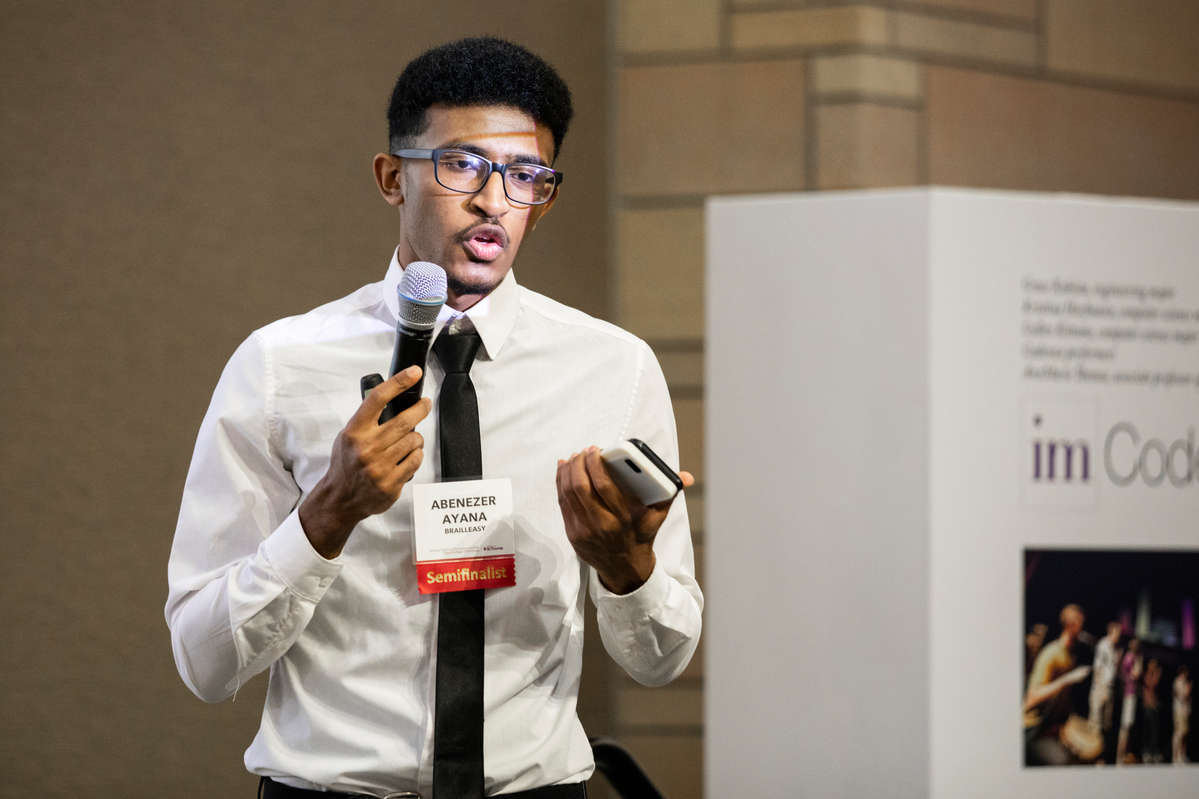
Abenezer Ayana delivers his pitch to a panel of judges during the Fowler Business Concept Challenge on Nov. 22, 2019. (Liam James Doyle/University of St. Thomas)
What successes have you had with the Schulze School of Entrepreneurship competitions?
Being a computer science student, I didn’t really know about Opus College of Business or the Schulze School of Entrepreneurship. On email, I saw there was a competition for business ideas and when I was a kid, I used to dream of competitions like these. I saw the email and applied.
St. Thomas offered a big resource of past competition submissions that I could really learn [from] because I didn't know about entrepreneurship. I didn't know how to pitch things, business models. I just had an idea.
So I dug into those resources.
The first competition was [during] my junior year at St. Thomas. I pitched an idea called OmniPresent. It was a technology that helped reduce bullying in schools. One of the things that prevents students that are being bullied to come out is fear.
It was a system where there's a camera attached, and if the student shows that they're being intimidated by someone, they can activate [it] and volunteers from all over the world can help out that student. It was based on the idea that people are deterred if there is an interaction with others, somebody who's watching.
The first idea I pitched was sort of a something that I had passionate about. Once I saw started watching “Shark Tank,” I was like, ‘Wow, this is exactly that.’”
I learned how investors think when they listen to an idea. It opened my insight into deeper questions that investors want to know.
I took all those things and applied them on my second submission, BraillEazy. My co-founder, Amanda Baumgart, and I worked on the idea which helps blind people read Braille easily. We're tackling the problem of Braille literacy crisis. We pitched and we were fortunate to get second place and receive a scholarship opportunity.
That was a moment that helped me a lot, because as an international student I have to pay tuition up front. That helped me continue my education and take classes in entrepreneurship.
After that I became very engaged in the school competitions; whenever there are any events that help entrepreneurs, I take advantage of that.
For instance, the Schulze School works with LegalCORPS, which is a platform that allows students to get legal support pro bono. That helped me register BraillEazy as a C Corporation in Minnesota [and] create our patent applications pro bono.
The Schulze School has all these connections, all these competitions that everyone should take advantage of. I'm happy that I was able to discover that, with my background in creativity and passion for entrepreneurship.
You are the founding ambassador to KINETIC, a new initiative founded by MIT to support the launch of one million Black-owned businesses. How did you first learn about KINETIC?
KINETIC was brought to the school by Dr. Laura Dunham, associate dean of the Schulze School. She had the connection with William Aulet, who is an MIT professor. He was the pioneer in creating this program in addition to Kevin Johnson, who is the founder of KINETIC.
Laura reached out to me and I was very happy about it. It was a very bold project – one million Black entrepreneurs by 2025 – [and it] was something that I personally was very happy to rally upon.
We have been working on creating the KINETIC-CON, which is a conference that brought Black and brown entrepreneurs from all across the country.
It was a very amazing program. It went for nine hours straight. I didn't even eat during that duration because I was just taking notes. I couldn’t believe that there was such passion and interest.
The program is aimed toward breaking down the barriers that restrict Black and brown entrepreneurs to succeed in the same space as their white counterparts. We discussed barriers. For instance, when you're starting a company, there's a friends and family stage where you get $10,000 or $50,000 to create your first minimum viable product.
For me, I don't have that background. I’m coming from a low-income background; my friends and family could not rally upon my ideas in the same way and help kick-start it.
As Black and brown entrepreneurs, we lack the financial grounds to begin in that same stage as our white counterparts. We’re talking about other resources that we can take advantage of.
People from companies like Comcast came and talked about the Comcast Rise program, which helps entrepreneurs raise as much as $10,000 for their business ideas. That was awesome to hear.
There was a lot of discussion with successful Black entrepreneurs, as far as raising capital.
For Black and brown entrepreneurs, we have the ideas. I know my counterparts in Ethiopia [have] a lot of great ideas, but they lack the infrastructure.
The Wi-Fi is not present, there's no internet, electricity runs out. I remember as a kid in Ethiopia studying and sometimes the light just goes off and you're like OK, I'm going to use the candle.
As a computer science student, I realize I can’t really achieve my full potential whenever there are those restrictions in the infrastructure.
There were so many discussions that wanted to help bring that to light and help build the infrastructure that entrepreneurs who have the capacity to become the next Elon Musk or Bill Gates to have that opportunity to succeed.
What are some aspirations that you have?
I want to create a start-up. I feel free when I take my own path. At the end of the day, I want to help people who are less fortunate back in my home country, in Africa and also in the U.S. I want to give back to the community whenever I can.
My aspiration is to level the playing field for everyone. For instance, in Ethiopia, there is a lack of housing access for people living in rural places, a lot of mothers dying from childbirth, [which] can be solved if a successful entrepreneur decides to invest and build hospitals. I want to make that happen.
If I could be in the stage where I can monetarily fund a project that can give students the opportunity to take education, and create their future, I want to do that. I think of money as a way give an opportunity.
Who is your favorite musician?
I love gospel music. My favorite gospel singer is Azeb Hailu.
She’s a gospel singer who I've listened to since I was a kid. I was able to meet her at a local church here once when she visited, and I was so happy. She's a big inspiration for me.
If you could invent anything, what would it be, and why?
If I could create sort of a time machine, I would invent a way to make amends or go back to our past and redo some things. Find your loved ones or go back to the place where you really want to have made a difference.
Later in the future, I would want to go back and spend more time with my loved ones more.
What do you want to be remembered for?
I want to be remembered for helping. My ultimate goal in life is to bring the word of God to people.
Eternally, there is another life with God. Introducing people to Christ, whether they accept him or not, is what I want to be remembered for. Giving the opportunity to know Christ and living an eternal life of happiness.
